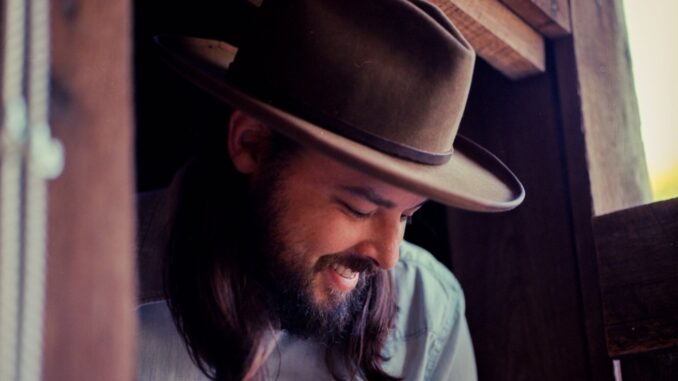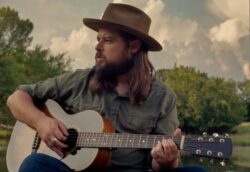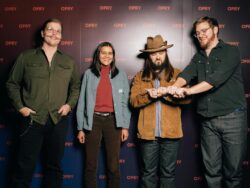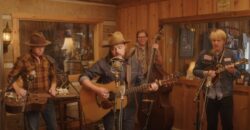
Caleb Caudle has been making music for longer than you might guess since the night he walked up to an open mic night, sat down and strummed his first chord in a live setting. He sings about the experience in the song ‘The Garage’ from his latest record, “Sweet Critters,” produced by his friend John Paul White (formerly of The Civil Wars) and Ben Tanner. “The garage in the song was a cinder block venue, a little bigger than this one here at Ted’s,” Caudle explained before playing a gig at the Wilmington, North Carolina listening room.. “It was in Winston-Salem and it’s where I cut my teeth. I went as a fan at first and then I did open mics and after a while started headlining shows. I had so many great experiences there. I was on tour when it shut down a few years back, and I wanted to steal all the posters off the walls.”
Americana fans are well aware of Caudle’s first person, country-folk narratives. He is prolific, having released eight albums in 10 or 11 years, and “Sweet Critters” may well be the best of the bunch. Not many would disagree, especially the overwhelming majority of critics, who have lauded his 11-track paean to country life and the people who cross your path. He is gifted in his ability to churn out vividly detailed narratives that remind one of the style of renowned novelist Sinclair Lewis and his signature work, “Main Street.”
Years of honing his craft, playing hundreds of shows in his particular stew of folk, gospel, country soul and funk, he can address weighty issues such as homecomings and growing into yourself, taking the time to notice the process with the sharp eye of a keen observer of the human condition.

“I come from a rural area – Germantown, North Carolina – and not a lot is going on out there,” he expressed. “I spend a lot of time in the woods. And I’m influenced by poets like Mary Oliver and Wendell Berry, who describe the natural world in a way that transports you to those places. I like anybody who’s good describing all the details, in particular John Prine and Guy Clark. Details are sort of the last frontier that can differentiate your songs from anybody else’s by really diving into your experiences and talking about things that maybe seem mundane, but put you in a place.”
Caudle is an authentic, no bullshit songwriter and deserves to be widely heard. Last year, he made his debut at the Grand Ol’ Opry and that can’t hurt the cause. He remarked: “I think you get to a point where you realize, hey, I’ve dedicated my life to this thing, and so I’m going to just do whatever I feel like it takes to keep it going, not only to sustain, but also to grow. I wanted to add a band, but the right band. And so that took a long time to put together piece by piece.” The Sweet Critters are Karl Zerfas on bass, Carter Giegerich, dobro and mandolin, Ben Tanner on piano and organ, Ken Lewis plays drums and percussion and John Duncan is on fiddle.

His songs reflect the pedestrianism of the common man yet are laced with an air of unpredictability that can’t go unnoticed. Whether he’s singing with a slight tongue-in-cheek flavor about what it’s like to have the right partner in life in ‘Hollywood Ending’ or describing in the title track how it feels watching people growing old and vulnerable with such articulation as to almost make you believe you are in the song yourself, Caudle is a superb storyteller.
‘River on Fire’ is one of the darkest songs Caudle has written and if Caudle had been killed during a robbery this would have made a great episode of the “Law & Order” TV series. You can sense the pain in his halted vocals as he describes being held up at gunpoint on the street, the strings adding a foreboding heaviness to the ballad. Empathy for the robber became the only way he could process the fear. He also used the title phrase in a stanza in ‘Carolina Ghost’ on the “Live at Cash Cabin” album. A couple are riding the backroads, singing harmonies: You’re preaching to the choir / When you say the rapids from the river couldn’t drown this fire. Even the simplest image, a bucket of rusty nails, is ominous and soupy as the bluesy dobro riffs slink through the atmospheric arrangement like a water moccasin in a steamy swamp on ‘Knee Deep Blues.’ Caudle yearns for peace of mind as he is “feeling bad and wishing I didn’t.” The most vital lyric comes in “Sweet Critters’ as the elderly couple who have been collecting little brass figurines are watching the light grow dim. He’s struggling with the stairs / She’s so scared / But they glow / On up until the curtains close. The figurines and feather referencing Tennessee Williams’ “The Glass Menagerie” are a nod to the expressive cover illustration by Molly Sherlock.

‘The Brim’ features Aoife O’Donovan’s limpid harmonies, as Caudle is on his way home, offering the line, An empty heart that’s filled to the brim like the third refill of a cup of coffee as you sit alone and lonesome at a diner. “That one’s my favorite love song I’ve ever written,” he affirms. “It’s about wishing everybody could see what you saw in someone. I was thinking of me and my wife. I think that’s really important to start picking up on the little things over time that you don’t pick up at first when everything is so dreamy and starry-eyed. Then humanity shows itself and a lot of struggles, ups and downs. We’ll be eight years married in September, and I best not forget to go shopping.”
‘Kentucky When You Called’ is a brighter contrast and crafted neatly about finding your way home to your loved one. It’s a buoyant southern charmer. “I wrote it after we played the Laurel Cove Festival up in Bell County, Kentucky,” Caudle said. “That one spilled out and I really like the details in it.” “Mountain Laurel’ is a straight up love ballad, a beautiful country song with an exhilarating melody that immerses us fully in Caudle’s relationship. “That’s the kind of song you have to write to the woman you’ll stay with,” Caudle says with assurance. He sings with a deep drawl on ‘The Devil’s Voice’, a song about addiction that hit painfully close to home (the devil’s voice sounds a whole lot like mine). “If you know someone like that,” he advised, “lend them a hand.”
For Caudle, it all goes back to practising radical empathy, like the sign in his yard. “I look at a small-town lady who’s an addict and just trying to extend empathy towards that,” he puts forth. “I think society gets that pretty wrong most of the time. They think of some people as lower class. A lot of times people even know they’re an addict before they are. It’s weird that there are billboards and commercials for drinking, and then we also look down on alcoholics. For me coming off of ten years not drinking, it’s hard to come to terms with getting beaten over the head with ads promoting drinking. It’s part of the culture, so drink but don’t have too much. That’s not how my mind is wired. It’s like when I do something I enjoy, I want to keep doing that as much as possible. People are wired differently, and I think practicing some nuance is probably good for all of us.”

Caudle sings and tells stories using tropes that clearly identify the Southeast’s landscape and mores, still as different from the rest of the US as Venus is to Mars. Memories that find their place in the present, while feeling haunted by the ghosts that linger from the past. He unpretentiously paints pictures with his phrases, which leaves us feeling so deeply ingrained in the goings-on of this place and the people who inhabit it.
Caudle is the type of guy you want to share a beer with and swap stories into the dead of night, or just listen to his tales. Even the stories that belong to someone else, he has the chops to make them his own. Keith Whitley wrote ‘Great High Mountain,’ the opening song on “Sweet Critters.” “I learned that off a Larry Sparks record called “John Deere Tractor,” and we do it a lot different,” he said in making the association. “It’s a great song; one I couldn’t get out of my head.” The lyrics are very spiritual like the line: You don’t have to move the stumbling blocks / Guide me Lord around them.
The song preaches the importance of faith and reliance on God in times of need, and Caudle sings it with fervour. “It could be about faith,” he mused, “or maybe more about endurance than anything. There’s a few on the record that are kind of about that. I’ve been doing this for so long now, for a little over a decade. It’s a lot of wear and tear. That one feels like it sets the scene for where I’ve been, where I’m going.”


